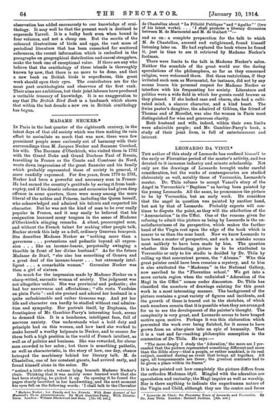MADAME NECKER.* IN Paris in the last quarter of the
eighteenth century, in the latest days of that old society which was then making its vain effort to assimilate so much that was new, there were few prominent people more curiously out of harmony with their surroundings than M. Jacques Necker and Suzanne Omaha, his wife. The Bayonne d'Oberkirch, who visited them in 1782 with the Grand Duke and Grand Duchess Panl of Russia, travelling in France as the Comte and Comtesse du Nord, wrote down impressions of the great financier and hie family which probably represented those of society in general, if more candidly expressed. For five years, from 1776 to 1781, Necker had been a powerful and necessary man in France- He bad earned the country's gratitude by saving it from bank- ruptcy, and if his drastic reforms and economies had given deep offence in some quarters, there were many among the more liberal of the nobles and Princes, including the Queen herself, who acknowledged and admired his talents and respected his character. But he was not the kind of man to be ever really popular in France, and it may easily be believed that his resignation loosened many tongues in the sense of Madame d'Oberkirch'a stinging remarks. A silent, preoccupied man, and without the French talent for making other people talk, Necker struck this lady as a dull, ordinary Genevan bourgeois. She describes Madame Necker as "nothing more than a governess . . . pretentious and pedantic beyond all expres. sion . . . like an incense-bearer, perpetually swinging a tburible in front of her divine husband." As for the future Madame de Stael, "she also has something of Geneva and a great deal of the incense-bearer . . . but extremely intel- ligent . . . a remarkable woman." Germaine Necker was then a girl of sixteen.
So much for the impression made by Madame Necker on a sharp-witted, sarcastic woman of society. The judgment was not altogether unfair. She was provincial and pedantic; she had her narrowness and affectations ; " elle resta Vaudoise en plein Paris ": and she praised and adored her husband in a quite unfashionable and rather tiresome way. And yet her life and character can hardly be studied without real admira- tion and sympathy. Her portrait itself, by Duplessis, the frontispiece of Mr. Gambier-Parry's interesting book, seems to demand this. It is a handsome, intelligent face, full of nervous anxiety. One understands what a hold duty and principle had on this woman, and how hard she worked to make herself a worthy helpmate to Necker, and to ensure for them both a high position in the world of French intellect, as well as of politics and business. She was rewarded, for clever men crowded to her salon ; but there is something pathetic, as well as characteristic, in the story of how, one day, chance betrayed the machinery behind her literary talk. M. de Chastellux, one of her constant guests, had arrived early, and found himself alone in the salon. He "noticed a little white volume lying beneath Madame Necker's chair. Thinking that it was merely some learned work that she had been studying, he picked it up. On opening it he found the pages closely inscribed in her handwriting, and the next moment his eyes fell on the following words shall talk to the Chevalier • Madame Meeker: her Family and her Friends. Wilt Bow Amount of her FDIstanda There ddminietrateme. By Mart Gambier-Parry. With Inman, tions. London William Blackwood and Sons. [12s. 6d, net.] de Chastellux about "La Felicit6 Publique "and "Agathe" ' (two of his latest works). . . . I shall promote a literary discussion between M. de Marmontel and M. de Guibert ' "-
and so on: a complete preparation for the talk to which H. de Chastellux, amused and enlightened, found himself listening later on. He had replaced the book where he found it, just in time to see it retrieved by Madame Necker's footman.
There were limits to the talk in Madame Necker's salon. Neither the scandals of the great world nor the daring speculations of the philosophers, so far as they concerned religion, were welcomed there. But these restrictions, if they irritated such men as Marmontel, for instance, did not by any means lessen his personal respect for Madame Necker or interfere with his frequenting her society. Literature and politics were a wide field in which her guests could browse as they pleased. If she lacked ease and charm, she had a culti- vated mind, a sincere character, and a kind heart. The Swiss pastor's daughter, the admired of Gibbon, the friend of Thomas and of Morellet, was also the woman in Paris most distinguished for wise and generous charity.
Both husband and wife, indeed, within their own limits were admirable people; and Mr. Gambier-Parry's book, a study of their joint lives, is full of entertainment and interest.






































 Previous page
Previous page